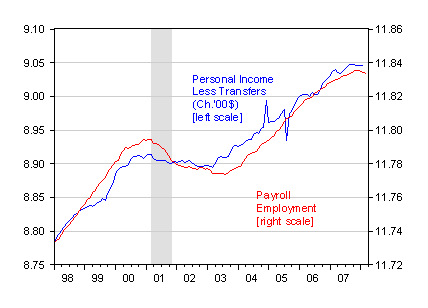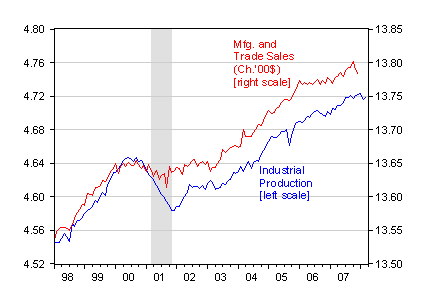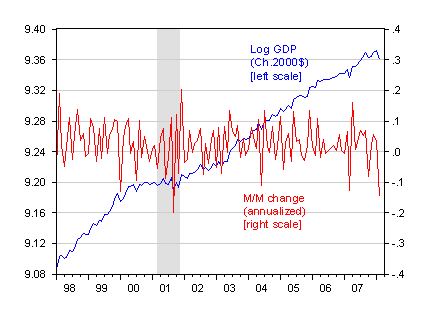From Reuters:
“We’re not in a recession, we’re in a slowdown,” Bush said at a news conference at the end of a two-day summit with Canadian Prime Minister Stephen Harper and Mexican President Felipe Calderon.
This statement was made with a seemingly amazing amount of certitude. So much so that I am impelled to ask, what does the President know, and when did he get to know it? For sure, he has access to data that we do not have. And he has an army of economists to advise and inform him. So I think he must know something I don’t.
His statement does give me the opportunity to update these graphs of series that the NBER places primary focus on in determining recessions.[1]

Figure 1: Log personal income less transfers in 2000Ch.$ (blue) and log nonfarm payroll employment. Real personal income calculated by subtracting off transfers from personal income, and deflating by the personal consumption expenditure deflator. NBER-defined recessions shaded gray. Source: BEA, St. Louis Fed FRED II, accessed 23 April 2008, and NBER.

Figure 2: Log industrial production (blue) and log manufacturing and trade sales, in Ch.2000$. NBER-defined recessions shaded gray.Source: Federal Reserve Board via St. Louis Fed FRED II, BEA, accessed 23 April 2008 and NBER. .

Figure 3: Log real GDP, in billions of Ch.2000$. NBER-defined recessions shaded gray.Source: Macroeconomic Advisers, accessed 23 April 2008, and NBER.
For its part, the NBER defines a recession thus:
A recession is a significant decline in economic activity spread across the economy, lasting more than a few months, normally visible in real GDP, real income, employment, industrial production, and wholesale-retail sales. …
A “slowdown”, while not explicitly defined by the President, conjures in my mind decreasing, but positive, growth rates in the indicators of economic activity. I’ll let the reader decide which characterization is most apt (of course, keeping in mind the role of data revisions — which in any case tend to be downward around (downward) turning points [2], [3]).
Other related discussion: WSJ RealTime Economics, WSJ MarketBeat.
Technorati Tags: recession,
personal income,
payroll employment, industrial production,
manufacturing and trade sales.
I thought what was interesting in this Bush quote was the last sentence: “I’m – of all the three of us standing up here, I’m probably the most concerned about the [US] slowdown.” The 2 others were the prime minister of Canada and the president of Mexico…
You can see the video of this:
http://www.youtube.com/watch?v=ta0WipZtlr0
Exports may keep gdp growth positive. But exports are goods and services we produce but do not consume. If recession was defined by what we consume (instead of what we produce) it would be a recession. Welcome to the world of export nation: low unemployment (we work to export), higher domestic prices (due to weak currency), and falling living standards (due to reduced consumption). This is why it “feels” like a recession but may not be.
There’s another possible take away of the “It’s not different this time” sort…
…maybe, just maybe all those economists – they’ve hand picked Brownie-like – have convinced Bush that ‘confidence’ is the most important thing he can give to the people; that nipping the febrile musings by the ‘liberal’ MTM in the bud will avert the possibility of an ‘R’ and maybe… just maybe, Bush is lying. Imagine that a politician lying, and Bush at that.
They call him ‘W,’ it stands for ‘Worst.’
Welcome to the world of export nation: low unemployment (we work to export), higher domestic prices (due to weak currency), and falling living standards (due to reduced consumption).
Good point. We’re all Germans/ Japanese now.
A bit of export oriented austerity might be just what the doctor ordered, though.
And in any case, the yen is back up to 104 to the dollar. So the “dollar collapse” story is as oversold as… the dollar!
Another possibility is the lack of information born of living in a bubble, combined with high levels of innate stupidity.
If you’ve ever known anyone like George Bush personally, you know that he knows everything, and has since the day he was born.
Reuters quotes Robert Hall saying “With monthly GDP down sharply and three consecutives months of declin in payroll employment, there seems little doubt about a genuine decline, though nowhere near enough to call a recession soon.” Also quotes Jeffrey Frankel saying “Things don’t look good” and that “a W-shapred recession is certainly a possibility.” Hall and Frankel are both on NBER’s business cycle timing committee.
Let’s not forget that this guy’s supporters have been sent out to claim that the last recession started before he arrived in office (contrary to NBER’s view). When you are a Bush, you get to say when recession are, whether wars are worth it, what ideas are good and what policies will lead to economic growth – without regard to much of anything in the real world.
Menzie
To be correct he could have said “I don’t know if we are in a recession or not, it will be decided later by the NBER”. But would you really expect a President to say that he thinks we are in a recession? And are you equally surprised that Ben Bernanke did not say “yes, we’re in a recession”? I am not sure that we really want another President to come out and say we are stuck in a “malaise”.
Big IP loss in April. My friend compared it to September 1990 in his field. After that, it was just down,down and more down.
Now that the real fun has begun, this summer should be fun.
Our monthly GDP in its lastest (March) reading indicates that the growth rate of the economy in the first quarter is going to be slightly above zero (0.1 percent). Unless the data is revised substantially downwards and the expected positive contributions from March trade data are not positive, it seems that the american economy in the first quarter was not in recession.
UPS, FedEX, Starbucks all seem to disagree with idiot Ws assessment of the economic situation. The only place I see doing any business is Subway with their $5 footlongs. Crowded as can be.
Oversold dollar? Go ahead and bet that one.
I humbly suggest that the superlative brainpower behind this blog should remain above hanging on every word from our politicians. Please stick to economics and data and their intepretation.
Oversold dollar? Go ahead and bet that one.
Wish I did when the yen was touching 96. Could have had an 8% return in 2 weeks.
If the dollar wasn’t oversold, why did the yen go from 96 to 104?
Where is it going to go from here?
Professor, technically, he is correct; until the NBER BCDC says so, we are not in a recession.
I track the NBER BCDC data, and conclude that we entered a recession in October.
For real retail sales (what is ‘wholesale-retail sale? I presume it means wholesale sales and retail sales), I use this:
http://research.stlouisfed.org/fred2/data/RRSFS.txt
C’mon, quit picking on Bush. They are all liars, from BJ Clinton to Greenspan and Bernanke.
More lying, in an attempt to delay the inevitable: MBIA and Ambac AAA?
I feel for the 99.9% of folks who have no idea about the tsunami that is about to hit.
jg: This is an excellent point, and I was thinking of titling the post “If a tree falls in the forest…”, referring to the fact that one could argue there’s no recession until one is declared. But it seemed to me that there is or is not a recession in this quarter, regardless of whether NBER BCDC has declared it. To assert without reservation that the economy is not in recession, without explanation, seems unwise.
GWG: No, I don’t expect a President to state the economy is in recession. But I expect some hedging, so as to retain some credibility. Indeed, the sentence you propose would’ve been great (and is essentially what Paulson has said).
What else is he going to say? The MSM has been beating the drums for recession for a year and recessions are always named after they occur and psychology does have an impact. The herd mentality cannot be ignored. This prompts a suggestion. Why don’t we name recessions like hurricanes. I suggest we honor senior senators with this distinction for their years of service. The Ted Kennedy recession of 2008?
As the leader of this country, I would expect Bush to tell us not to worry as the sun explodes in supernova.
jg: I use what Hall used in his spreadsheet: the series in Table 2BU at the BEA website.
My guess is that GDP data is released next week and certainly he has been provided with the fact that GDP is still positive but below 1%, more close to 0%. Exports can help but certainly usa exports airplanes, warfare, and what else? and much of its industrial net has been located overseas, so I dont think usa makes toys, clothes, despite the devalued dollar because of globalitation. I cant see usa moving 20 mm jobs from services to industrie as Brad de Long suggested time ago to weather this crisis.
I notice that the recession 08 contract price continues to decline on InTrade. Per Ironman, the window for recession is rapidly closing.
Thanks, Professor, for the BEA link; very helpful.
If the US doesn’t export anything other than “planes and warfare” (nice one), how is it that our industrial production is the highest ever?
Industrial EMPLOYMENT may be falling, but don’t let productivity growth fool you into thinking that output is falling.
There are still plenty of US factories out there, and export oriented growth via a lower dollar is a legitimate and effective economic policy. Ask the Japanese.
“There are still plenty of US factories out there, and export oriented growth via a lower dollar is a legitimate and effective economic policy”
That was real specific. Is it TVs, computers, cell phones, autos, memory, chips? We so export beef until we get caught slipping in a few spines.
c&ped: ….(of course, keeping in mind the role of data revisions — which in any case tend to be downward around (downward) turning points [2], [3])
Menzie Chen: Interesting. Is this a stylized fact with support beyond or rather behind the 2000 and 2001 period? Any support from other economies? If so, would you or others have a reference that examines national accounting data revisions at GDP downturn periods?
A significant correlation between downward revisions and negative GDP growth episodes would make sense to the extent that simple linear extrapolation-forecasts are used to compile early GDP estimates coupled with the well recognized inability to forecast structural breaks.
On a somewhat related issue, if memory serves, yield curve forecasting technology was still working for the last US recession (~2000-2001). However, the revised data strikes me as dating the beginning of the recession at an earlier date than forecast by standard in-use yield curve forecasting models at the time.
E.Poole: I haven’t checked this formally myself, but the vintage data is available at this St. Louis Fed website. This paper by Dynan and Elmendorf seems to speak to the issue (haven’t read it yet).
You say: “This statement was made with a seemingly amazing amount of certitude. So much so that I am impelled to ask, what does the President know, and when did he get to know it?”
What about this President compells you to seek that answer? In 8 years he has shown (1) that the facts that he has access to are not reliable, and (2) that his public utterances have little or no relation to fact, but (3) are engineered to influence public opinion. He will not utter the word “recession” now, because it is not in his interest to do so.
In contrast, let’s remember that 7 years ago he was saying the word “recession” all the time, because he was pushing major tax cuts.
“If recession was defined by what we consume (instead of what we produce) it would be a recession. ”
Not at all true. Exports might be up a little, but we obviously still import far more than we export, i.e. we consume far more than we produce. Times must be boomin’.